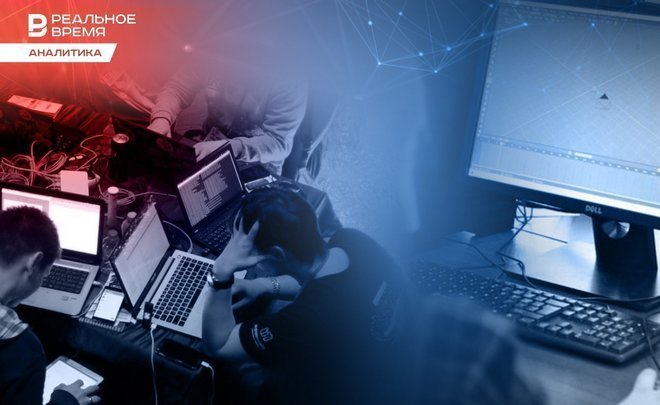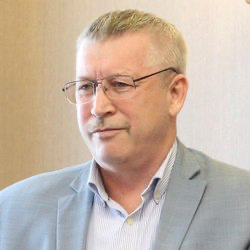Has the peak of popularity of IT professions passed?
Will the fate of lawyers and accountants from the 1990s befall Russian IT specialists?

Graduates of short-term IT specialists training courses were the first to feel their lack of demand in the Russian labour market. Today, the level of competition among IT specialists is twice as high as the average among applicants in Tatarstan: if in June there were an average of 2,8 resumes per vacancy in the republic, then in the IT segment — 6,2. Competition among IT specialists has reached the level when employers begin to dictate requirements. Whether the state should think about regulating the number of future IT specialists and optimise the number of students in IT areas, and whether parents of applicants should choose a university and training programmes more competently — in the review of the analytical service of Realnoe Vremya.
In June in Tatarstan, the level of competition (hh index) in the IT sector amounted to 6,2 resumes per vacancy. During the first month of summer, employers posted about 2 thousand vacancies, and applicants — 12,8 thousand resumes. Competition between job seekers among IT specialists is higher than the average in the labour market. In the republic, the hh index for June amounted to only 2,8 resumes for a vacancy, the hh.ru press service stressed.
6,2 job resumes are a healthy ratio between employers and job seekers, meaning a moderate level of competition.
Interpretation of the hh index values
- less than or equal to 1,9 — an acute shortage of applicants
- 2-3,9 — shortage of applicants
- 4-7,9 — moderate level of competition for jobs, healthy ratio between employers and job seekers
- 8-11,9 — high level of competition of job seekers for jobs, the employer's market
- more than or equal to 12 — an extremely high level of competition among job seekers
IT specialists will also be replaced by AI
The current processes on the labour market among IT specialists are similar to the situation of demand for lawyers and economists in the late 90s of the last century, says Rustam Shayakhmetov, the economist and head of RT-Invest.
The competition of applicants in the IT field will increase due to the introduction of artificial intelligence technologies and the continued growth in the number of students in IT specialties. AI by automating the work of IT specialists significantly increases their productivity, which reduces the need for personnel. First of all, this will affect workers engaged in routine work, that is, the grassroots, the economist believes.

However, according to the data of the Admission To University Online superservice, which 550 thousand applicants have used this year, the most popular areas among those entering the budget are still economics, law and management — despite the abundance of such personnel on the market since the 90s of the last century. Computer science and computer engineering are only the 5th. Those wishing to study for IT specialists are overtaken, for example, by those for Pedagogical Education.
In Tatarstan, 11 universities and 27 institutions of secondary special education annually train about 4,5 thousand IT specialists. And the shortage of IT personnel, according to the Ministry of Finance of the Republic of Tatarstan, is estimated at 5 thousand people.
Everyone needed?
“IT is among the areas with the largest number of vacancies offered, along with sales, industry, construction and logistics. Information technology companies offer some of the highest earnings in Tatarstan. The annual growth of employers' salary offers in IT in Tatarstan amounted to 8%, and for some specialisations even more: for example, Java programmers' average salaries increased by 10%, DevOps engineers — by 11%, the SuperJob press service noted. “Russia has a large and diversified economy. Everyone is needed.”
In all industries, the greatest demand is for specialists with higher than average qualifications. These are hundreds and hundreds of different specialties. “Comparing the demand for bakers and programmers does not make the slightest sense. Bakers, doctors, couriers and everyone else are needed," SuperJob is convinced.
Highly qualified programmers are still in high demand, and their salaries are growing. Junior specialists, especially graduates of short-term courses, are needed less — as in any crisis. “Today specialists with a strong mathematical base are needed, and there are few of them," the press service summed up.
Almira Yakusheva, a human resources expert, HR generalist of Escort Group, also does not agree that IT specialists will repeat the fate of lawyers and accountants.

Today, there are few universities in the country that train IT specialists, for the most part universities give basic basic concepts in several directions, and after that the student chooses what they are interested in to develop, the expert notes.
“It is much more important to give students the opportunity to take a real internship in companies by their profile, so they will have a good opportunity to try their hand at real projects, and the company with the right internship after graduation will have a ready loyal employee," she believes.
According to her estimates, specialists in the field of information technology, engineers, technologists, designers and specialists engaged in technical documentation are in short supply today. At the same time, there are many students in these areas, but it is difficult for most of them to find a job without experience, which indicates that universities today do not understand the needs of real business well.
“The active growth of the IT market and the increased interest in the IT profession makes some worry that IT specialists may 'repeat the fate' of lawyers and accountants in the 90s. However, we do not see any prerequisites for the emergence of an oversupply of personnel in the field of information technology in the foreseeable future. Although the analogy is interesting, but we should take into account that the IT field is developing in a completely different way and on a different scale," agrees Nadezhda Neelova, the head of ANCOR recruitment consultants group.
New technologies and high-tech industries are emerging, which require specialists who are able to work effectively with new tools. The same applies to the use of AI: the demand for those who can interact with it correctly will only increase in the coming years. Besides, the trend towards digitalisation continues to develop actively: after banks, large production facilities and organisations in the fuel and energy sector begin to form their IT teams. Due to this, the demand for IT specialists is only growing even faster, the expert explains.
“So far, the problem of regulating the number of students in the IT specialty is not relevant. Firstly, there are few necessary specialists. Secondly, unfortunately, classical higher education in state universities does not keep up with the requirements of the market — there is no technology training at the modern level. At the same time, education at commercial courses is not a panacea, questions also often arise to it," says Neelova. “Therefore, now it is more important for the state to focus on the implementation of quality standards of such education in both state and commercial institutions. So that students get relevant hard skills that meet the needs of the market.”
There is an overabundance of “deception courses” on the market

According to the expert, there is certainly an influx of people into the industry. But since last year, about 60 thousand additional jobs for IT specialists have also appeared in Russia. “This is primarily information security and IT security due to the May Day decree of the president on the formation of appropriate structures and departments in state-owned companies, corporations, ministries and departments," Murtazin recalled. “Therefore, there are needs for IT specialists.”
The main problem is that universities do not always cope with their preparation. “We train good specialists in limited universities, and they are brought up by work. Therefore, we predict an overabundance of low-quality specialists who are not needed by anyone," the expert believes.
The number of students in IT areas, in his opinion, does not need to be optimised, but the state could intervene in the direction of the quality of training. “Today, according to a speculative assessment, two-thirds of specialists who graduate from IT departments are not ready for real work in principle. They don't even understand what their job is," Murtazin emphasises. “Universities that cooperate with real companies and big business, where business people teach, are better prepared. Because practitioners tell students about what can be useful to them in life, and, as a matter of fact, provide them with work. This is really very important, and this is a working scheme.”
“Every second worker is actually an IT specialist”
“There is a fundamental trend with IT towards the demand for the profession, and despite AI, the demand is getting higher," Vasil Zakiev, the co-founder of Sputnik, ex-project manager of the business incubator of the Kazan and Naberezhnye Chelny IT Parks, disagrees.

It should be understood that for one employed classical developer, there are more and more managers, designers and sellers, who also need an IT education.
“At the micro-level of my companies, I don't see that the situation in the labour market has changed much. Salaries are still high and continue to grow. There are still few candidates, and hiring is slow. Developers are still calm about dismissal, because they instantly find a new job," says Zakiev.
However, the market for such long-term “goods” as higher education regulates itself very poorly. “Of course, the industry, together with the state, should make certain forecasts for the future, and in connection with these forecasts, create an 'order' in the form of the required number of specialised budget places in universities," he agrees. “And the clean market may slightly tighten compliance with this forecast due to faster paid courses, re-profiling and advanced training.”
“I've never liked the fanatical desire to crank out IT specialists”

“On the other hand, even if you crank out a fairly large number of IT specialists, nothing terrible will happen. A person with a good technical education is able to rebuild and will always be in demand. Graduates of our physicotechnical university demonstrate this very well. Many legendary IT entrepreneurs in Russia are physicists and mathematicians by education. Therefore, even if there is an overabundance of specialists with technical education on the market, they will be able to be useful to the market in other areas of the economy," Ganiev is convinced.
At the same time, the co-founder of Technocracy is convinced that in the future the bar for the quality of engineers will grow, and most of the routine tasks that are now taught mainly by online schools will really be replaced by technology. “Look at what Tilda has done to the web development market. Now a person without programming skills can create websites. It was also a kind of revolution," Bulat Ganiev gives an example.
“I've never liked the fanatical desire to crank out IT specialists. Maybe it is justified now, because there is a big demand for digitalisation. But in general, from the point of view of entrepreneurship development, the country lacks high-quality humanitarian education — strategic marketing and advertising. And these are such humanitarian fields as philosophy, history, psychology. I am against when the state focuses on only one industry.”